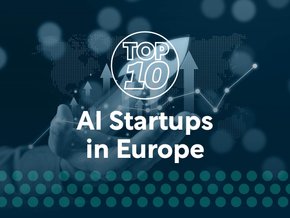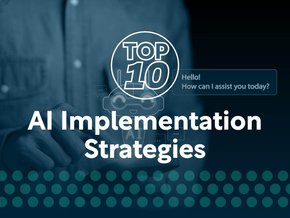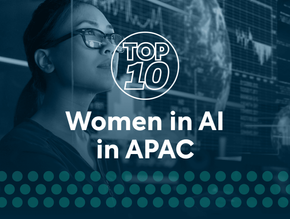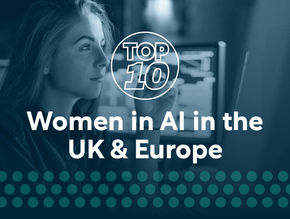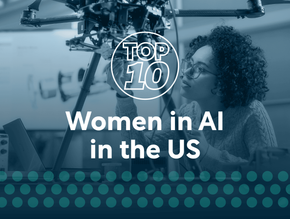Top 10 companies offering AI solutions over the cloud

To harness the power of AI, many organisations are turning to cloud platforms that offer robust and scalable AI capabilities. These AI cloud platforms provide a wide range of tools, frameworks, and services that enable businesses to build, deploy, and manage AI applications efficiently and effectively.
This week, AI Magazine explores the top 10 AI cloud platforms globally.
10: DataRobot
DataRobot operates an enterprise AI platform to provide businesses access to machine learning. The platform features automation capabilities across the building, deployment, and management stages of creating machine learning models, as well as AI implementation, training and support services.
With its AI Cloud for Industries platform, DataRobot allows customers to harness the power of AI across the entire lifecycle, and this end-to-end platform is designed for the challenges and opportunities facing key industries today.
9. Salesforce
Salesforce's Einstein AI platform offers seamlessly integrated AI solutions with other Salesforce cloud offerings. This empowers customers to harness the power of machine learning and predictive analytics, using their Salesforce data to build applications like chatbots and sales prediction tools. By providing valuable insights from customer data, Salesforce enables businesses to strengthen relationships, prioritise leads, cases, and campaigns, and drive their business forward with data-driven decision making.
8: Alibaba Cloud
Across Asia, Alibaba Cloud is the leading cloud computing platform and offers its customers a sophisticated Machine Learning Platform for AI. The platform provides clients with a visual interface for ease-of-use. With this functionality, companies can drag and drop various components into a canvas to assemble their personalised AI functionality.
Alibaba’s platform also includes scores of algorithm components that can handle any number of chores, enabling customers to use pre-built solutions.
7: Wipro Holmes
Wipro Holmes, harnesses the power of cognitive computing, hyper-automation, robotics, cloud, analytics, and emerging technologies to help clients adapt and thrive to the changing landscape of the digital world.
The Wipro Holmes AI and automation platform covers all aspects of deploying AI, from building to publishing, metering, governing and monetising. Among its features are digital virtual agents and process automation, as well as support for robotics and drones.
6: Oracle Cloud Infrastructure AI Services
Oracle Cloud Infrastructure (OCI) AI Services is a collection of services with prebuilt machine learning models that make it easier for developers to apply AI to applications and business operations. The models can be custom-trained for more accurate business results. Teams within an organisation can reuse the models, datasets, and data labels across services. OCI AI Services makes it possible for developers to easily add machine learning to apps without slowing down application development.
5: IBM Watson Studio
IBM Watson Studio empowers data scientists, developers and analysts to build, run and manage AI models, and optimise decisions anywhere on IBM Cloud Pak® for Data. Unite teams, automate AI lifecycles and speed time to value on an open multi cloud architecture.
Bring together open source frameworks like PyTorch, TensorFlow and scikit-learn with IBM and its ecosystem tools for code-based and visual data science. Work with Jupyter notebooks, JupyterLab and CLIs — or in languages such as Python, R and Scala.
4: H2O.ai
Making AI models used to take data scientists months or even years, but with the H2O AI Cloud, any individual data analyst, developer, or data scientist can make world-class AI models and applications in a matter of minutes, rapidly putting AI into the hands of business users.
Our state-of-the-art AI platform enables organisations like yours to rapidly solve business problems with AI for virtually any use case, to not only transform your organisation, but also your customers, communities, and the world.
3: Google Cloud AI
Google AI Platform allows for the creation of applications that run on both the Google Cloud Platform and on-premises. It targets machine learning developers, data scientists and data engineers with an easier route from the ideas to the production stage, thanks to its flexibility and support for other Google platforms such as Kubeflow.
With native support for other Google AI products such as TensorFlow, Google’s solution promises an end-to-end approach, with everything from preparing data to validation and deployment contained under one umbrella.
With the accelerating adoption of generative AI, in March Google announced developers and businesses would be able to try new APIs and products that make it easy, safe and scalable to start building with Google’s best AI models through Google Cloud and a new prototyping environment called MakerSuite.
2: Microsoft Azure AI
Microsoft’s AI platform integrates with its Azure cloud product, which it says is suitable for mission-critical solutions. Enabling features such as image analytics, speech comprehension and prediction, Microsoft’s solution claims to be useful for all developers, from data scientists to app developers and machine learning engineers.
Part of its offering is based on an ethical and responsible approach to AI, with systems to mitigate bias as well as ensure confidentiality and compliance.
Azure AI enables developers and data scientists to do more with less. Take advantage of the decades of breakthrough research, responsible AI practises, and flexibility that Azure AI offers to build and deploy your own AI solutions. Access high-quality vision, speech, language, and decision-making AI models through simple API calls, and create your own machine learning models using an AI supercomputing infrastructure, familiar tools like Jupyter Notebooks and Visual Studio Code, and open-source frameworks like TensorFlow and PyTorch—all backed by Microsoft's responsible AI principles.
5: IBM Watson Studio
IBM Watson Studio empowers data scientists, developers and analysts to build, run and manage AI models, and optimise decisions anywhere on IBM Cloud Pak® for Data. Unite teams, automate AI lifecycles and speed time to value on an open multi-cloud architecture.
The platform enables users to bring together open source frameworks like PyTorch, TensorFlow and scikit-learn with IBM and its ecosystem tools for code-based and visual data science, and work with Jupyter notebooks, JupyterLab and CLIs — or in languages such as Python, R and Scala.
4: H2O.ai
Making AI models used to take data scientists months or even years, but with the H2O AI Cloud, any individual data analyst, developer, or data scientist can make world-class AI models and applications in a matter of minutes, rapidly putting AI into the hands of business users.
H2O.ai's state-of-the-art AI platform enables organisations to rapidly solve business problems with AI for virtually any use case.
3: Google Cloud AI
Google AI Platform allows for the creation of applications that run on both the Google Cloud Platform and on-premises. It targets machine learning developers, data scientists and data engineers with an easier route from the ideas to the production stage, thanks to its flexibility and support for other Google platforms such as Kubeflow.
With native support for other Google AI products such as TensorFlow, Google’s solution promises an end-to-end approach, with everything from preparing data to validation and deployment contained under one umbrella.
With the accelerating adoption of generative AI, in March Google announced developers and businesses would be able to try new APIs and products that make it easy, safe and scalable to start building with Google’s best AI models through Google Cloud and a new prototyping environment called MakerSuite.
2: Microsoft Azure AI
Microsoft’s AI platform integrates with its Azure cloud product, which it says is suitable for mission-critical solutions. Enabling features such as image analytics, speech comprehension and prediction, Microsoft’s solution claims to be useful for all developers, from data scientists to app developers and machine learning engineers.
Part of its offering is based on an ethical and responsible approach to AI, with systems to mitigate bias as well as ensure confidentiality and compliance.
Azure AI enables developers and data scientists to do more with less. Users can access high-quality vision, speech, language, and decision-making AI models through simple API calls, and create their own ML models using an AI supercomputing infrastructure, familiar tools like Jupyter Notebooks and Visual Studio Code, and open-source frameworks like TensorFlow and PyTorch—all backed by Microsoft's responsible AI principles.
1: AWS AI Services
AWS provides a wide range of AI products and services designed for both consumers and businesses. Many of its professional AI services are built upon the AI technologies used in its consumer products.
One of its notable consumer AI products is Alexa, which is integrated into the Amazon Echo and brings AI into homes with its intelligent voice server. In addition, AWS offers several primary AI services, including Lex for building conversational interfaces, Polly for text-to-speech conversion, and Rekognition for image recognition.
Moreover, Amazon Machine Learning offers visualisation tools that simplify the process of creating machine learning (ML) models, eliminating the need to master complex ML algorithms and technologies. These user-friendly tools empower customers to leverage ML capabilities without extensive technical expertise.

